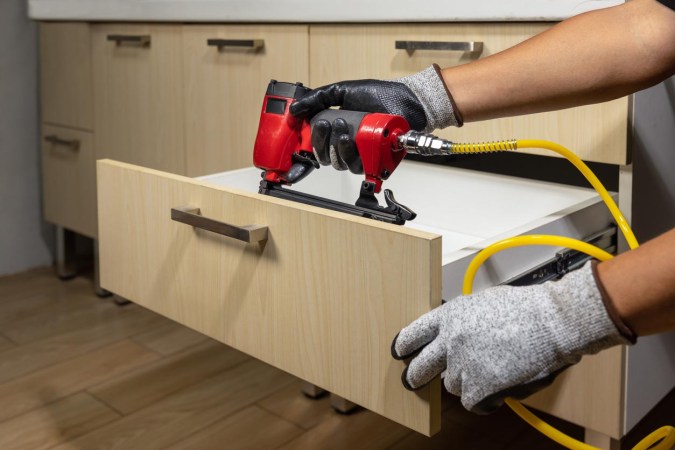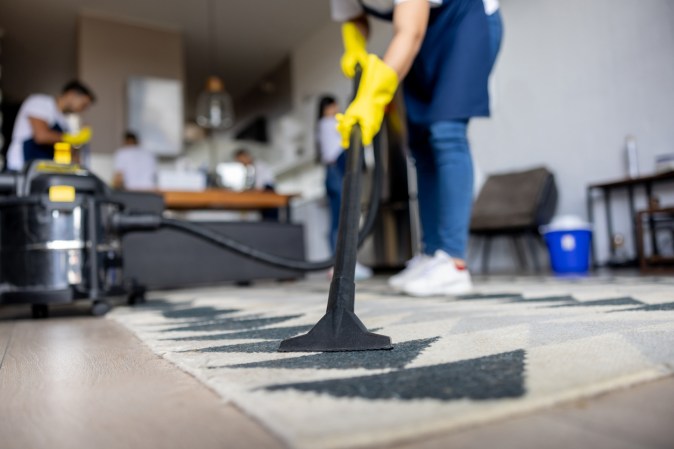We may earn revenue from the products available on this page and participate in affiliate programs. Learn More ›
Q: I’m thinking about starting a handyman business in my home state, but I’m not sure if I need to apply for any special licenses or permits. Does a handyman need a license to operate, and if not, are there any benefits to having one?
A: The question of whether a handyman needs a license is a crucial consideration for someone who’s thinking about starting a handyman business. These regulations are not just formal procedures; they serve as a framework for safety, quality, and legal compliance for those who are providing handyman services.
Those wishing to become a handyman business owner will need to understand the intricacies of licensing requirements in their state or local jurisdiction. This includes recognizing when a handyman license is mandatory, understanding how to get a business license, and identifying the potential advantages of being a licensed professional in the handyman industry.
This comprehensive guide covers the types of business licenses a handyman might need so that prospective entrepreneurs can ensure they are abiding by their local laws.
An individual’s state of residence will determine whether they need a license to work as a handyman.
Every state has its own handyman business code, including different criteria for when and why a license is necessary. Aspiring handyman will want to spend some time learning about their state’s handyman legislation, including any specific handyman license requirements.
Some states may require a handyman to carry a license if they perform work valued over a certain dollar amount, for example. Other states may require a handyman to have a specific license to perform more specialized work, such as electrical, plumbing, and HVAC projects. Failure to comply with these requirements may result in the handyman being fined or otherwise penalized.
Before filling out their handyman application for a license, it’s advisable for handymen in states with licensing requirements to look up their local handyman license costs and the answer to the question, “does a handyman need to be bonded in [state name]” to ensure they are meeting all obligations.

Some states have a “handyman exemption” that allows a handyman to take on jobs below a certain dollar amount without needing a license.
Many states implement a “handyman exemption”—a provision that allows handymen to undertake certain jobs without the need for a professional license—if jobs fall below a specified dollar amount. This exemption is designed to facilitate minor home repairs and maintenance work, recognizing that not all tasks require the same level of oversight as more extensive, high-value projects.
The threshold for the handyman exemption varies from state to state, with each setting its own monetary limit to define the scope of work under this rule. For instance, a state might allow handymen to perform tasks that total up to a certain amount per job or per year without requiring a handyman business license. This exemption is particularly beneficial for small-scale professionals or those just starting in the trade who don’t have a handyman background, as it allows them to legally offer their services for smaller jobs without the complexities and costs associated with obtaining a full contractor’s license. However, handymen will want to be aware of and adhere to the specific limits and conditions of the handyman exemption in their state to ensure compliance with local regulations.
Jobs that exceed the labor and cost limit may require a handyman to obtain a business license.
When the value of a job (both in labor and material costs) surpasses the threshold set by the handyman exemption in a state, it often means the handyman must obtain a business license or a home improvement contractor’s license. This requirement comes into play for more substantial projects, where the complexity and expense call for more regulation and oversight.
These larger projects typically involve more risks and a greater need for professional expertise and accountability. By mandating a license for such work, states aim to protect consumers and ensure that anyone performing these more involved tasks has the necessary qualifications and adheres to building codes and safety standards.
For handymen, securing a business or contractor’s license under these circumstances not only aligns with legal requirements but also enhances their credibility and trustworthiness in the eyes of potential clients. This process may involve additional steps, such as proving competency in the trade, obtaining insurance, and possibly passing a handyman license exam issued by their contractor state license board.

Depending on location, an unlicensed handyman can typically perform basic home maintenance tasks, such as painting, furniture assembly, minor plumbing and electrical tasks, and flooring repair or installation.
In many locations, an unlicensed general handyman can still offer various basic home maintenance services to address common household needs. These tasks typically include painting—whether it’s a touch-up or a full room repaint—and furniture assembly. Minor plumbing and electrical tasks, including fixing leaky faucets, unclogging drains, replacing light fixtures, or installing simple electrical devices, also fall under the umbrella of an unlicensed handyman.
Handymen are often skilled in flooring repair or installation as well, handling everything from fixing a loose tile to laying down a new laminate floor. These services are generally considered low-risk and do not require the specialized training and certification that more complex electrical or plumbing work might demand. Focusing on less intensive tasks allows unlicensed handymen to provide valuable assistance to homeowners needing quick, efficient solutions for everyday home maintenance.
A handyman will likely need a professional license to perform more specialized tasks involving plumbing, electrical, and HVAC.
A handyman will typically be required to have a professional license for more specialized tasks, particularly those involving plumbing, electrical work, and HVAC systems. Because these areas of work are often complex and potentially risky, handymen offering these services need to have specific knowledge and a deeper understanding of specific codes and safety regulations.
Plumbing tasks might include installing new pipes or fixtures; electrical work could involve wiring an entire room or installing complex electrical systems; and HVAC work often requires the installation or major repair of heating and cooling units. To perform these tasks legally and safely, a handyman must obtain the relevant professional license, which usually involves a combination of specialized training, passing a licensing exam, and meeting certain experience requirements. This licensing process ensures that the handyman has the skills and knowledge to handle these more intricate and potentially hazardous jobs, providing peace of mind and protection for both the customer and the handyman. It can also increase handyman costs, which can help the business owner justify the cost of licensure.

Jobs that involve structural changes to a building and require a permit will likely need to be handled by a licensed professional.
Any structural changes to a building, such as altering load-bearing walls, adding new rooms, or significantly modifying existing structures, will require a permit. This type of work will likely need to be handled by a licensed handyman. Structural modifications are complex and carry significant safety implications, which requires a high level of expertise and compliance with building codes and regulations.
A handyman is typically required to have professional credentials in order to obtain the necessary permits for this type of project. A licensed contractor or specialist is equipped with the knowledge and authority to navigate these requirements, ensuring that the work is not only performed correctly but also meets all legal and safety standards.
For customers, hiring a licensed professional for such substantial projects ensures the structural integrity of their home and maintains compliance with local building codes and regulations. If a homeowner hires an unlicensed handyman and the project isn’t completed properly, this can impact insurance coverage and property values.
Even if a license isn’t required, customers may prefer to hire a licensed and insured handyman over one who is unlicensed.
Even in cases where a license isn’t necessarily required for certain handyman tasks, it can be a good business decision for those in the business to pursue handyman certifications. In addition to obtaining the required licenses, it’s also a good idea for handymen to obtain insurance from one of the best handyman insurance companies, such as NEXT or Thimble. Business owners will want to budget for handyman insurance costs of around $65 per month.
For many homeowners, the peace of mind that comes with hiring a licensed and insured handyman outweighs the potential cost savings of hiring an unlicensed individual or business, particularly for bigger or complex projects. This preference underscores the value that customers place on professionalism, expertise, and security when it comes to home maintenance and improvement services. Therefore, doing due diligence and taking the time to get a business license is an essential component of how to be a handyman and compete with the best handyman services.









